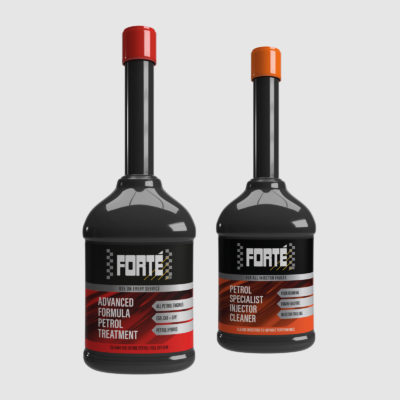Complete petrol system clean
Extended service intervals, driving styles and conditions, along with the latest vehicle technology can all contribute to fuel system contamination:
- Contaminated injectors
- EGR valve contamination
- Sticking inlet valves
- Catalyst failure/blockage
- High fuel consumption
- High exhaust emissions
- Carbon loading of the engine oil
High pressure Direct injection
Direct petrol injection systems inject fuel directly into the combustion chamber. The combustion chamber geometry design ensures an optimum mix of fuel and air. The air/fuel mixing occurs inside the combustion chamber rather than in the inlet ports. Taking this approach gives a far greater variety of combustion operating modes.
Stratified charge mode
At low torque up to 3000 rpm, the engine is operated in Stratified Charge Mode. In this mode, the injector adds fuel during the compression stroke, just before the spark plug fires. Aided by the manifold swirl flaps, airflow movement within the combustion chamber directs the air/fuel mixture towards the sparkplug. This results in a portion of a relatively rich air/fuel mixture surrounding the sparkplug electrode while the rest of the combustion chamber is fairly lean. In some systems, the mixture can be as lean as 55:1 compared to a conventional port fuel injection using an air-fuel ratio of 14.7:1.
Homogeneous mode
Homogenous Mode injection starts on the intake stroke, so there is sufficient time for the air/fuel mixture to be distributed throughout the combustion chamber and is used at high torque outputs and high engine speeds.
Dual injection
Dual Injection is a combination of direct and indirect injection. Injectors are located in the air intake (low-pressure MPI system) and the combustion chamber (high pressure) in the same engine. In part-load operation, the indirect injection assists direct petrol injection in improving fuel economy and reducing the output of particulates from the engine.
High output tight tolerance
Innovative engineering and reduced weight materials combined with the efficiency of direct fuel injection offers car owners the drive and performance usually associated with much bigger engines. These systems provide significantly improved fuel consumption and CO2 emissions and can include turbo power to optimise torque. Changes in engine design, cooling system efficiency and operation, active cylinder technology and internal drive belt systems give these small compact engines the ability to meet stringent emissions targets whilst offering power and driveability.
Ethanol fuel (E5 + E10)
Ethanol is hydroscopic and can affect driveability and lead to corrosion of aluminium, zinc and galvanised materials, brass, copper, and lead/tin coated steels. Ethanol is also a solvent that can cause problems with many seals, hoses and gasket materials, cork, polyurethane, fibreglass and epoxy resins. Besides a risk of fuel leaks, rubber components and resins can become partially dissolved, producing deposits that could foul Injectors and carburettor jets. E10 may cause some predetonation (‘pinking’) and perhaps a little rough running and poor cold starting performance.
Gasoline particulate filters
Gasoline Particulate filters are fitted to petrol engines to meet the Euro 6c (2017) regulation on particulate numbers for petrol engines. Direct injection engines help improve fuel economy and reduce CO2 emissions; however, they produce higher volumes of particulates than standard petrol engines. Gasoline Particulate Filter (GPF) technology enables the reduction of particulate emissions from the tailpipe. The GPF will regenerate more easily than a DPF (Diesel Particulate Filter) and is induced naturally when the driver stops accelerating and the GPF is hot enough.
Forté Complete petrol system clean
Add 1 x Advanced Formula Petrol Treatment and 1 x Petrol Special Injector Cleaner to the fuel tank on every service (or when required) to remove fuel system contamination, protect and lubricate the engine and restore vehicle performance and driveability.
Compatible with all petrol fuel; E5, E10 and up to E20.

